Overview
The article titled "10 Common Title Defects in Oil and Gas You Need to Know" primarily focuses on identifying and elucidating prevalent issues that can emerge during title research within the oil and gas industry. It underscores the critical importance of comprehending these defects, which include:
- Incorrectly held royalty interests
- Discrepancies in ownership information
Furthermore, it highlights the pivotal role of advanced technologies such as Parse AI in efficiently addressing and rectifying these challenges, thereby ensuring the accuracy and marketability of titles.
Introduction
Navigating the complexities of title defects in the oil and gas industry presents a significant challenge, one that can lead to substantial financial repercussions. With billions at stake due to incomplete records, discrepancies, and legal ambiguities, it is imperative for real estate professionals to understand these common title defects.
What strategies can be employed to mitigate these risks and ensure the integrity of property transactions? This article delves into the ten most prevalent title defects, offering insights and solutions designed to safeguard ownership and streamline the research process.
Parse AI: Streamline Title Research with Advanced Document Processing
Parse AI harnesses the power of advanced machine learning and optical character recognition (OCR) to revolutionize the research process for documents. By swiftly extracting crucial information from extensive collections of document titles, the platform empowers researchers to effectively identify and rectify common title defects in oil and gas. This groundbreaking technology significantly while enhancing accuracy, enabling real estate professionals to concentrate on problem-solving rather than being overwhelmed by paperwork.
Furthermore, the ongoing enhancement framework, developed in collaboration with land service experts, ensures that Parse AI adapts to the ever-evolving challenges in property research, solidifying its position as an indispensable tool in the industry. Successful applications of OCR in real estate have illustrated its capacity to streamline document processing, with numerous professionals acknowledging that such technologies have transformed their workflows.
As the demand for efficiency escalates, the integration of OCR and machine learning is becoming increasingly essential for real estate professionals striving to maintain a competitive edge.
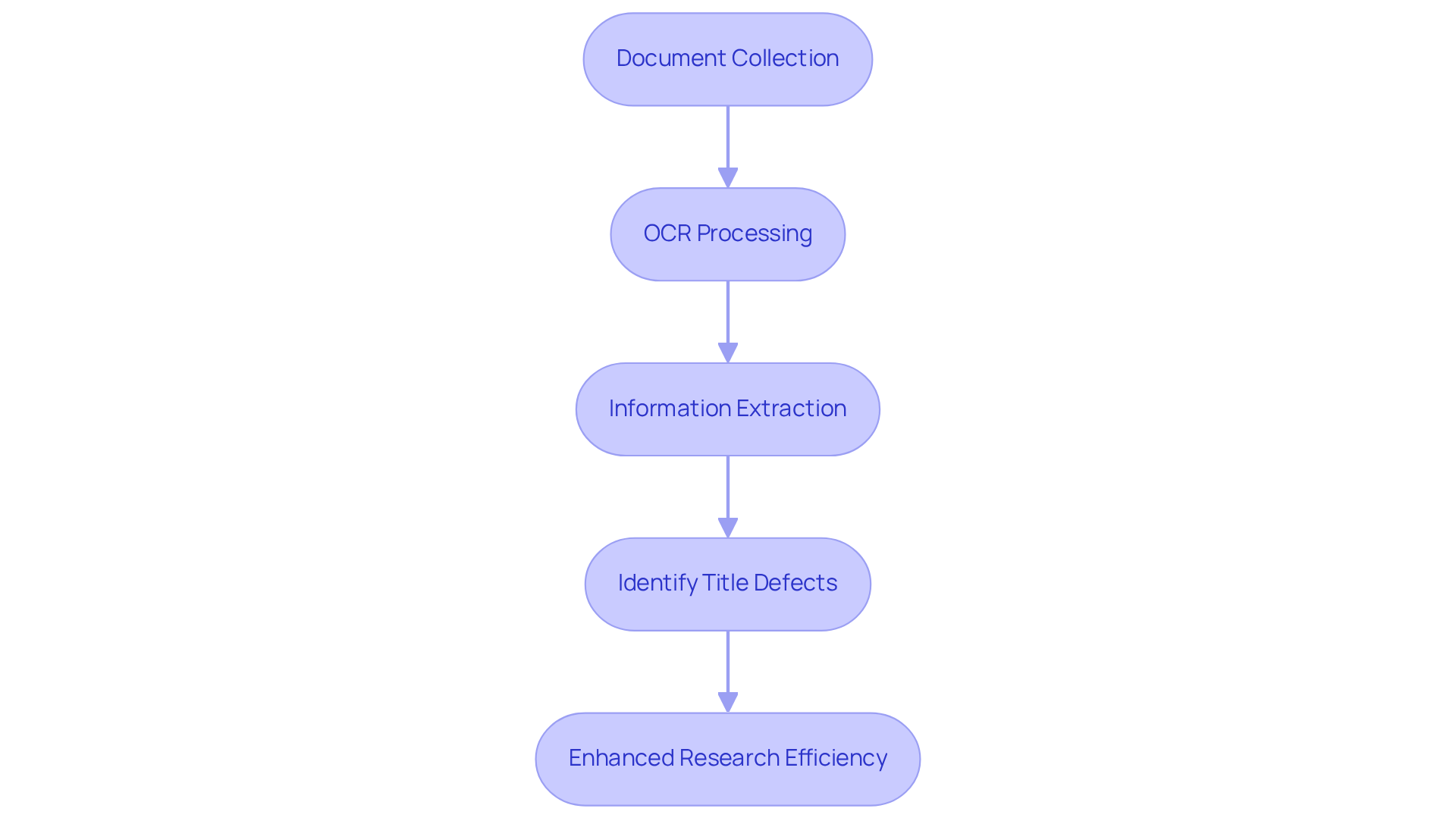
Incomplete Title Records: Risks and Remedies
Incomplete ownership records present significant risks, including disputes over possession and potential financial losses. The sector's estimated pre-curative risk exposure ranges from $600 to $900 billion annually, underscoring the urgency of addressing these challenges.
To combat this issue, researchers must conduct thorough searches, utilizing , which can swiftly extract essential information from extensive collections of documents to identify gaps in documentation. A systematic approach to verifying all records, particularly historical documents, is essential for mitigating these risks.
Furthermore, collaborating with attorneys to create corrective instruments can effectively address discrepancies, as highlighted in the case study on clearing title defects through judicial processes. This proactive strategy not only safeguards asset interests but also ensures smoother transactions.
Title researchers are urged to apply these remedies carefully to protect against the substantial risks that can arise from incorrect or outdated information.
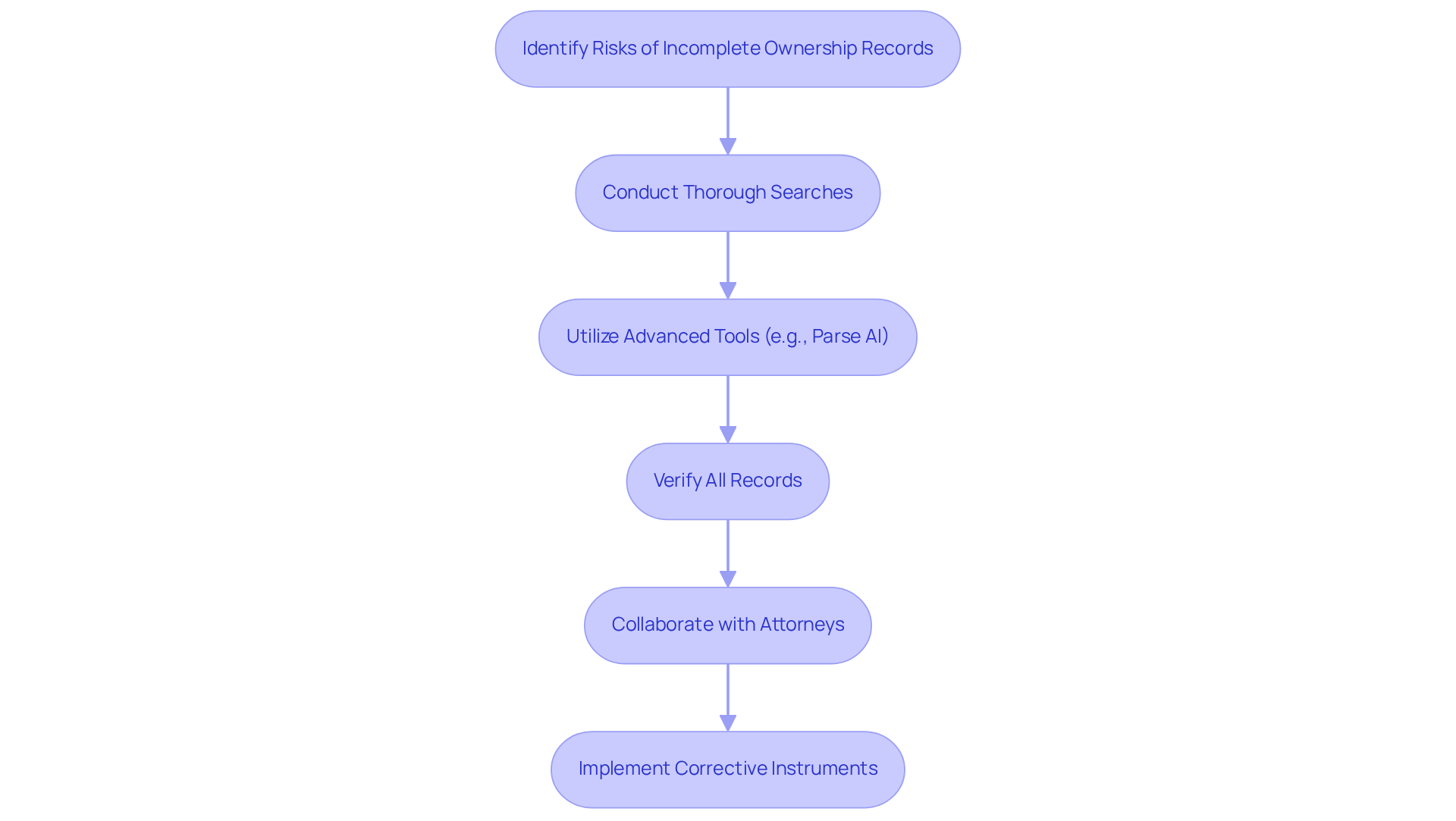
Discrepancies in Ownership Information: Identifying and Resolving Issues
Discrepancies in ownership information often arise from clerical errors, outdated records, or unrecorded transfers. Title researchers must diligently cross-reference ownership records with public databases and historical documents to identify these issues. Statistics reveal that inaccuracies in real estate deeds can lead to disputes over ownership and boundary lines, complicating transactions. In fact, mistakes in public land records can result in delays, legal issues, and financial losses for all parties involved.
Utilizing significantly accelerates this process by swiftly detecting discrepancies in document titles. As one specialist noted, "Title agents play an essential role in identifying and addressing these errors to ensure that incorrect public records do not hinder the closing process and transactions involving real estate."
Once discrepancies are identified, corrective measures—such as filing affidavits or corrective deeds—can be implemented to rectify the issues, ensuring that ownership records accurately reflect the current status. Furthermore, homeowner's ownership insurance protects against hidden encumbrances and boundary disputes, offering a critical safeguard for property owners. This proactive approach not only mitigates potential challenges but also fosters trust and confidence in the research process.
Title researchers are encouraged to integrate technology like Parse AI into their workflows to enhance both efficiency and accuracy.
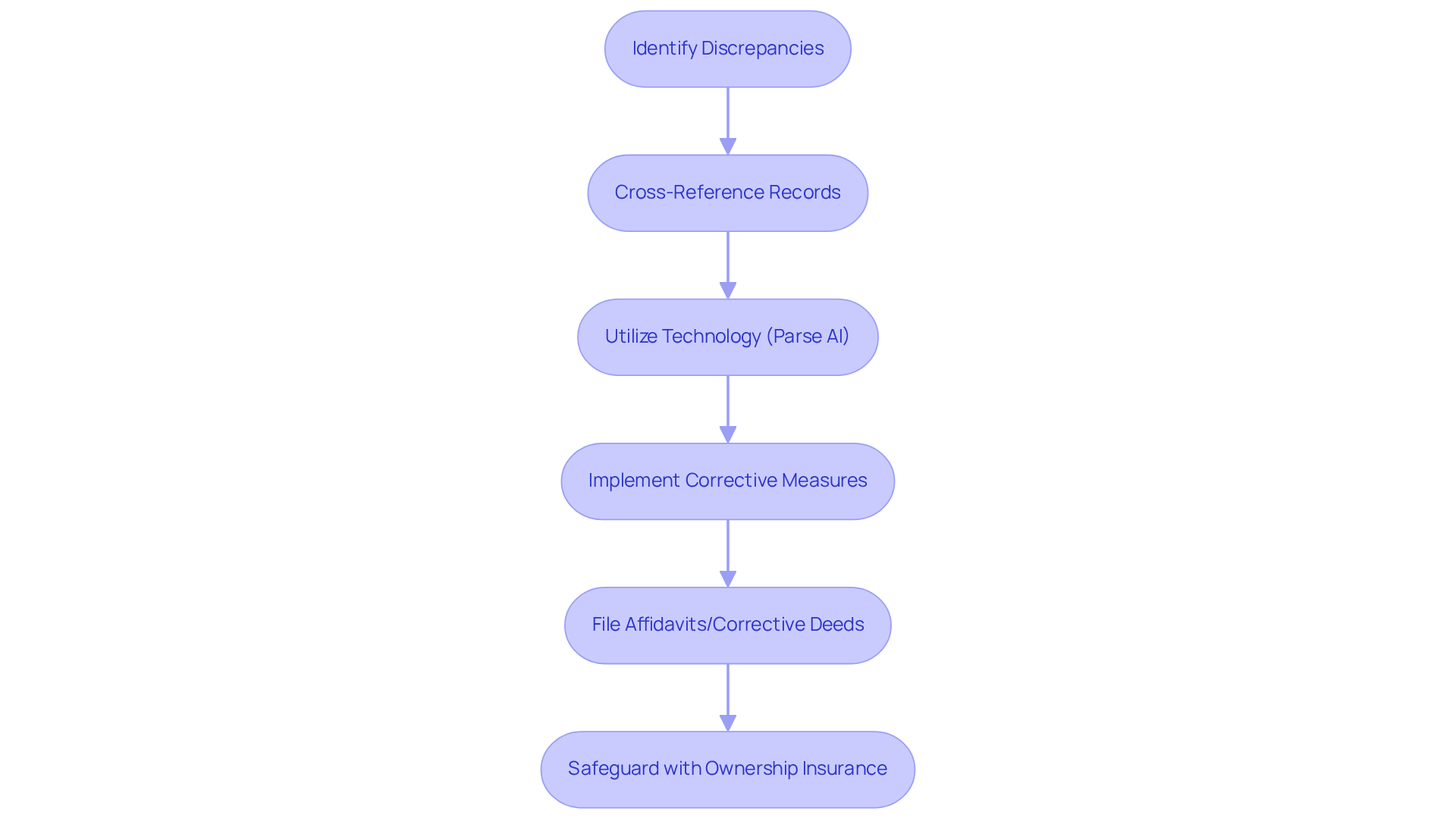
Complex Legal Language: Challenges in Title Interpretation
The complex formal language found in ownership documents often presents significant challenges for researchers, complicating the accurate understanding of rights and responsibilities. This complexity can lead to misunderstandings, underscoring the need for title researchers to become proficient in common legal terms and phrases. Legal jargon not only creates barriers for attorneys but also for non-professionals, highlighting the broader implications of such terminology.
To effectively navigate these challenges, it is essential to implement successful strategies for interpreting complex legal language, including the . Furthermore, utilizing advanced tools like Parse AI can greatly assist in this endeavor, as its document processing capabilities clarify ambiguous language by providing contextual insights and definitions. This approach not only enhances the accuracy of interpretations but also streamlines the research process, ultimately benefiting real estate professionals.
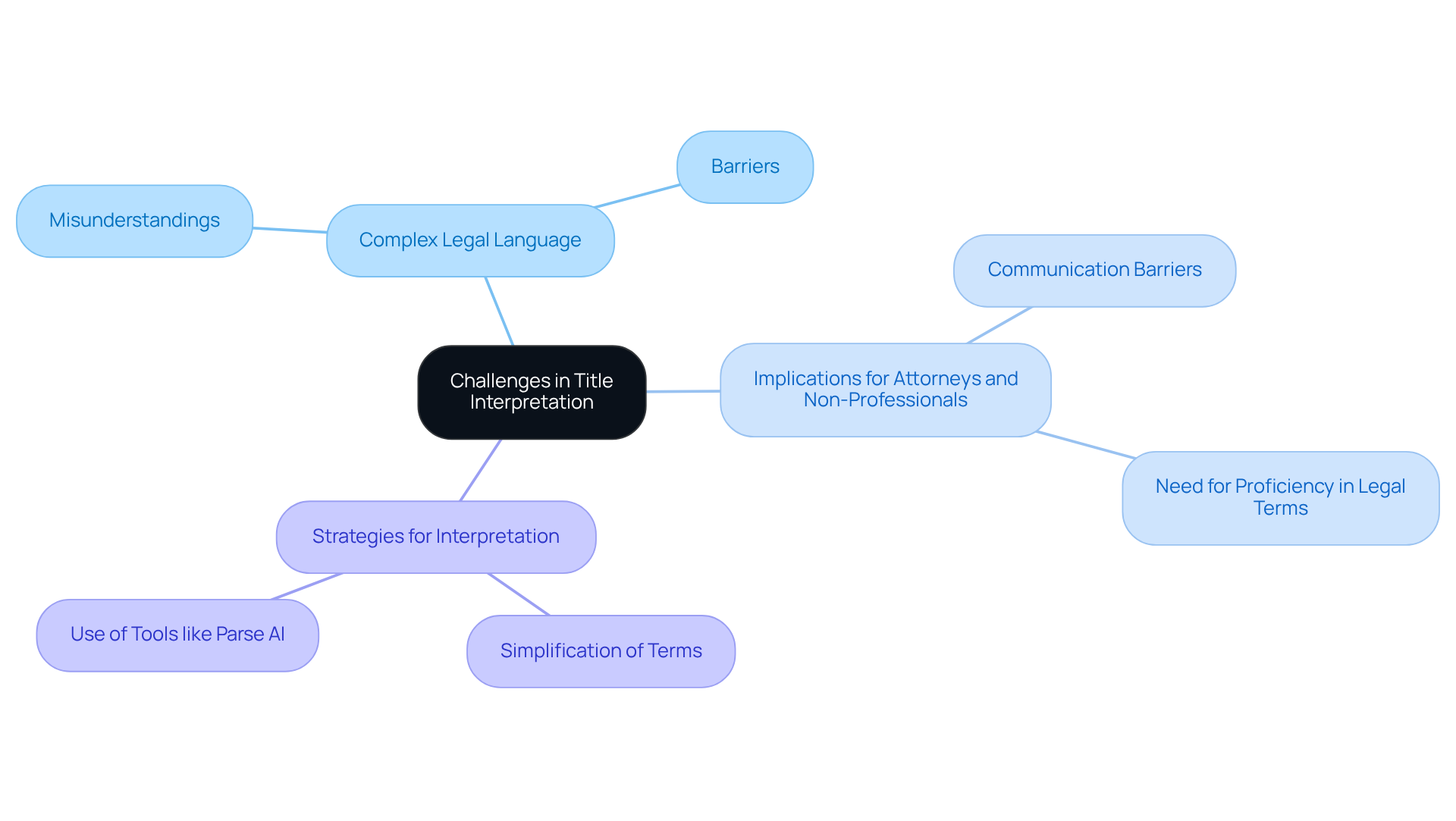
Boundary Disputes: Navigating Ownership Conflicts
Boundary conflicts frequently arise from ambiguous land boundaries, contradictory surveys, or historical assertions, rendering them a prevalent challenge in ownership research. To effectively navigate these conflicts, title researchers should prioritize and collaborate closely with professional surveyors. These specialists employ advanced technology to define accurate property limits, which is essential considering that boundary-related conflicts represent 45% of neighbor disagreements. Additionally, 1 in 5 homebuyers reported a boundary concern or issue during the homebuying process.
Furthermore, utilizing official descriptions and historical maps can offer important context and clarity in addressing conflicts. In situations where conflicts persist without resolution, pursuing legal action, such as a quiet title suit, may be essential to clearly establish ownership rights and avoid future disagreements. As one experienced surveyor remarked, investing in a professional survey is considerably less expensive than dealing with the consequences of boundary conflicts or construction mistakes.
Moreover, as Sarah Lee highlights, "You can avoid boundary conflicts by maintaining clear property lines, communicating with your neighbors, and conducting regular land surveys." It's also crucial to consider that attorney fees for real estate conflicts can vary from $2,000 to $50,000, emphasizing the potential financial consequences of unresolved disputes.
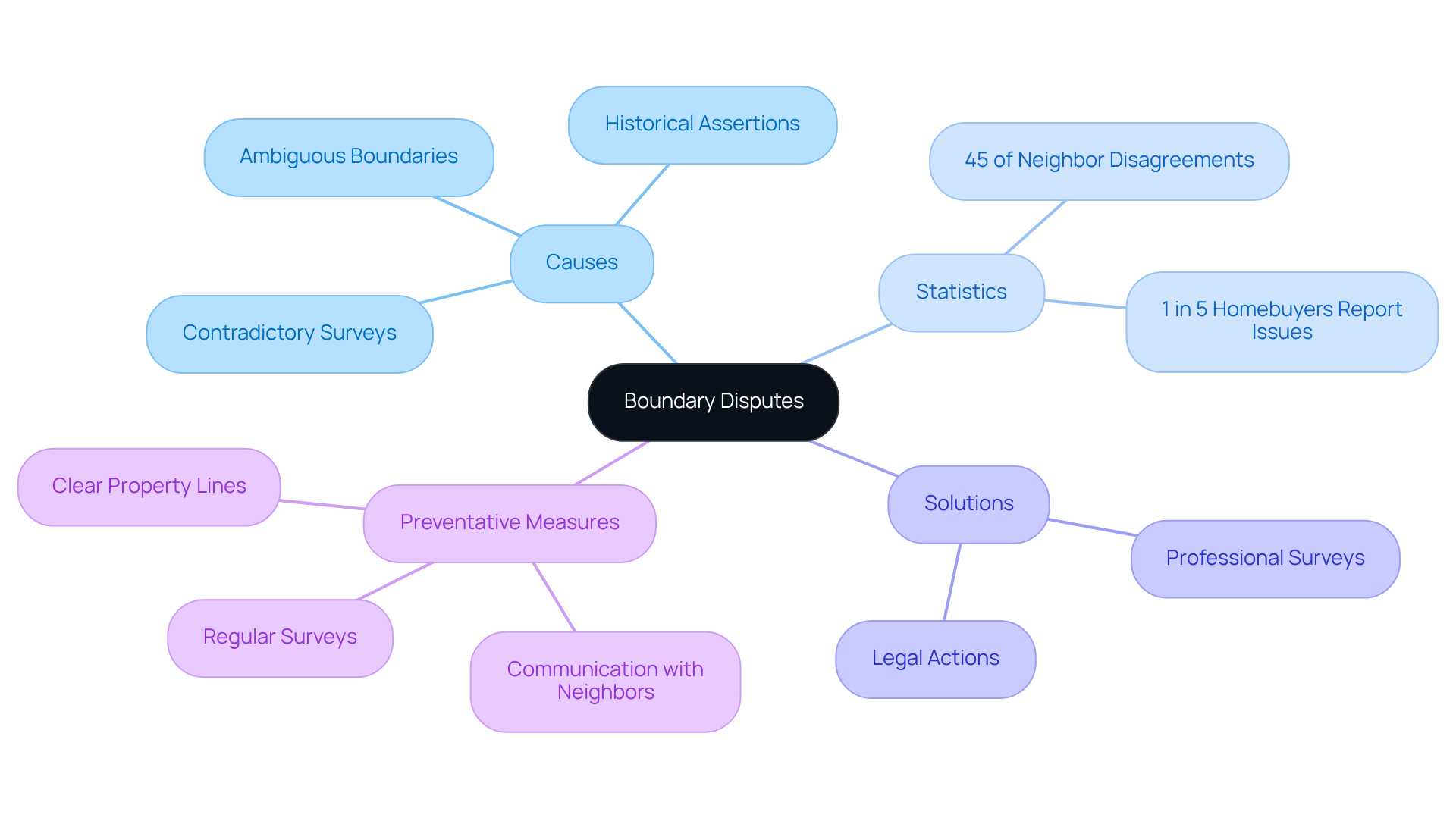
Adverse Possession Claims: Understanding Their Impact on Title
Adverse possession is a legal doctrine that empowers individuals to claim ownership of land they have occupied without the owner's permission, provided they meet specific legal criteria. This doctrine significantly impacts landowners; neglecting to address potential claims can lead to loss of ownership. Title researchers must exercise diligence in identifying during their investigations, as these claims can emerge from prolonged, open, and notorious use of a location.
Establishing adverse possession necessitates demonstrating continuous and exclusive possession for a statutory period, which typically ranges from 5 to 30 years, depending on the jurisdiction. For example, in Texas, the statutory period is 7 years, while California requires only 5 years. Consulting legal advice is crucial for evaluating the legitimacy of any adverse possession claims discovered during ownership research. Lawyers can provide guidance on essential actions to undertake, such as filing a quiet title action to clarify ownership and protect rights.
Data indicates that adverse possession claims are not uncommon in real estate, often resulting in disputes that complicate transactions. Effective strategies for managing these risks include:
- Maintaining clear land boundaries
- Routinely inspecting the area for unauthorized use
- Documenting any enhancements made to the site
By proactively overseeing these aspects, property owners can mitigate the risk of adverse possession claims and ensure a more transparent ownership for future transactions.
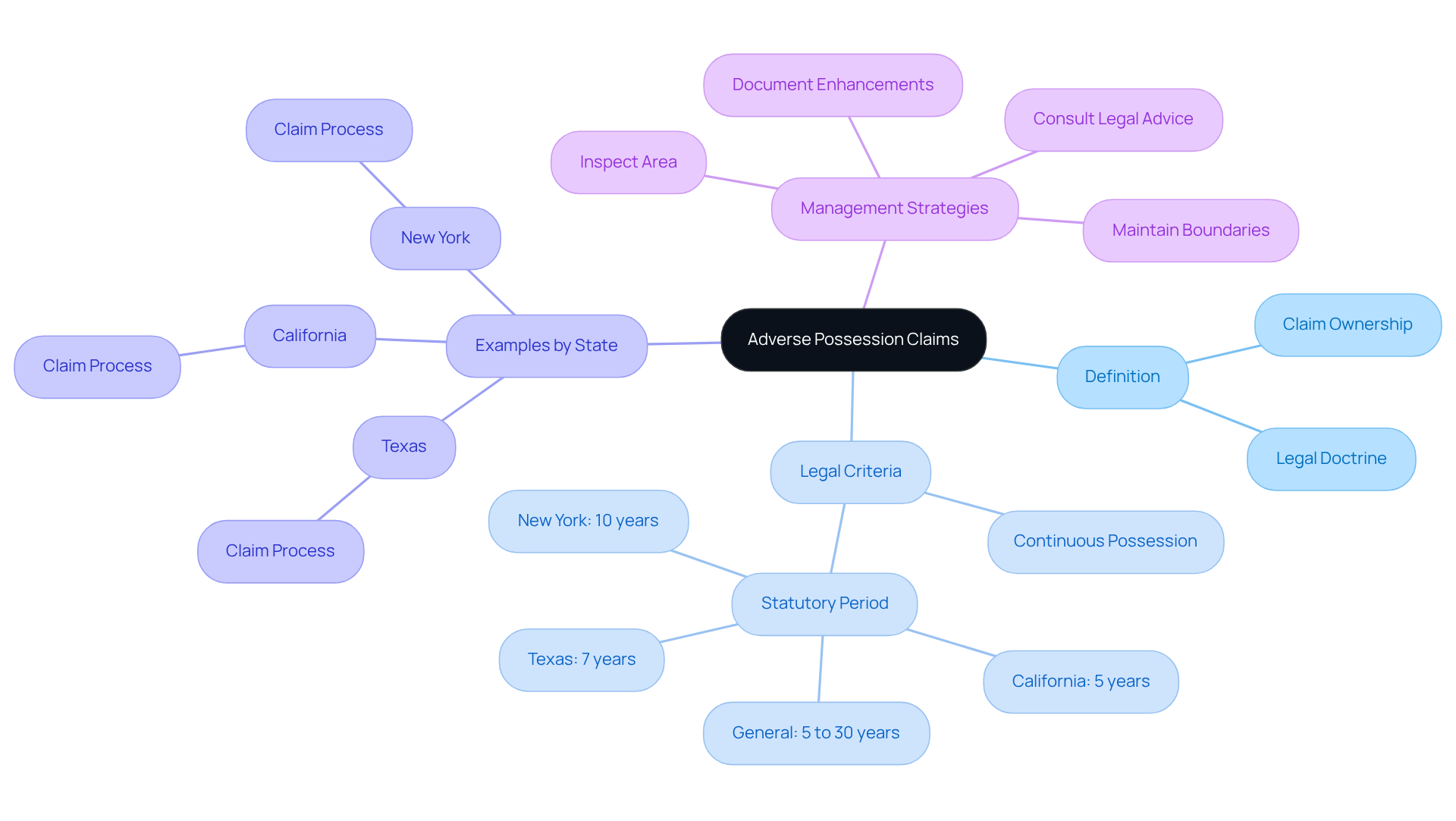
Incorrectly Held Royalty Interests: Identifying and Correcting Errors
Common title defects in oil and gas can arise from incorrectly held royalty interests due to miscalculations, clerical errors, or outdated agreements. To identify , researchers responsible for titles must conduct thorough reviews of royalty agreements and payment records. Furthermore, utilizing Parse AI can streamline this process by quickly analyzing large volumes of documents for discrepancies.
Once errors, particularly common title defects in oil and gas, are identified, corrective measures—such as amending agreements or filing claims for unpaid royalties—should be pursued to ensure that all parties receive their rightful compensation. Timely and accurate royalty interest payments are essential for financial stability. This is highlighted by case studies such as 'Understanding the Importance of Timely and Accurate Payments,' which emphasizes the critical nature of these payments in maintaining trust between mineral rights owners and oil and gas companies.
In addition, the average number of days to process an Application for Permit to Drill (APD) can impact the timeliness of these payments, underscoring the financial implications of errors. Consequently, failure to ensure timely payments can lead to penalties and legal disputes, further complicating relationships in the industry.
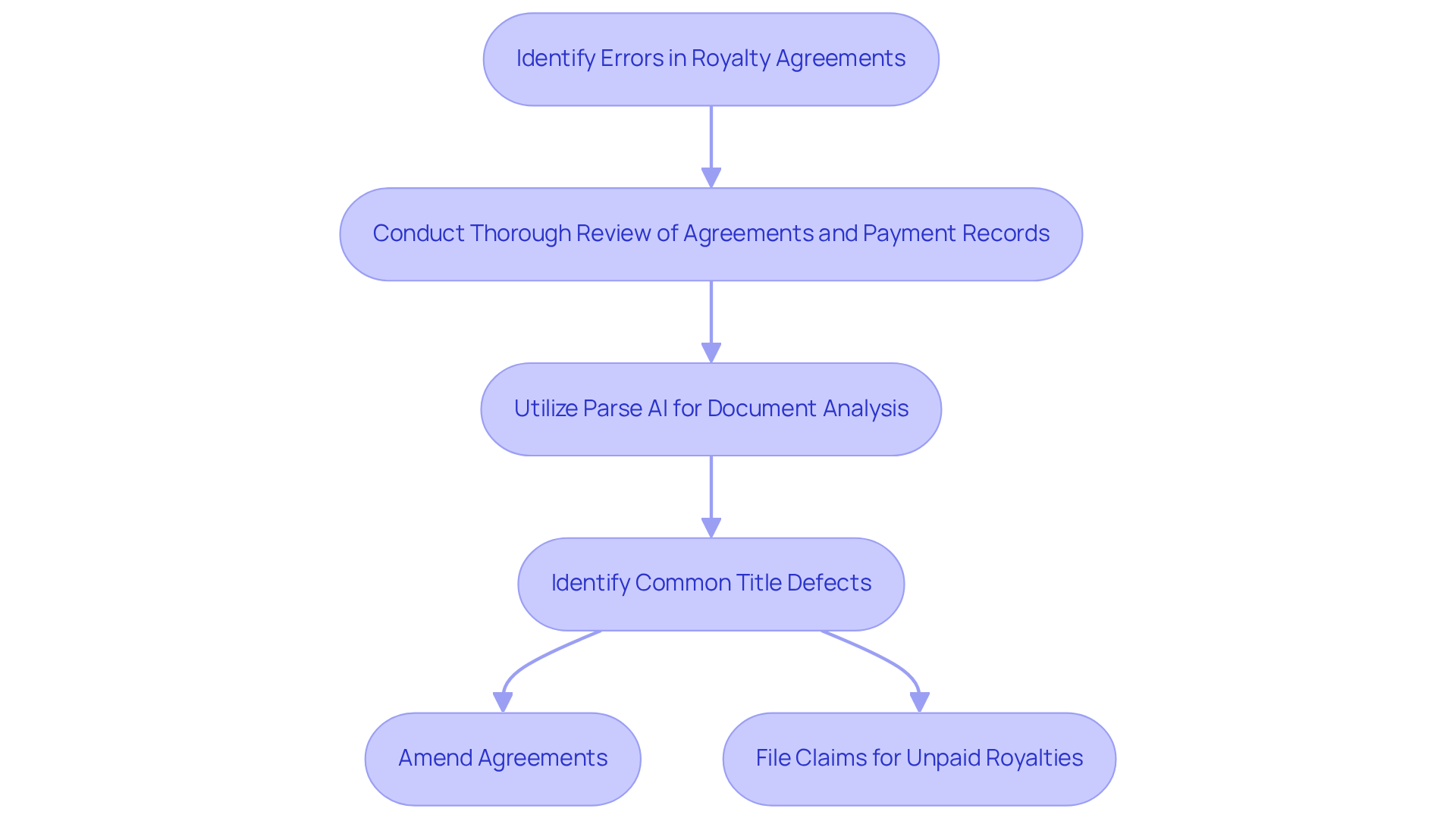
Title Issues from Mergers and Acquisitions: Key Considerations
Mergers and acquisitions often involve the transfer of numerous properties, which complicates the verification process. Accurate title research is paramount; researchers must engage in thorough due diligence to uncover any common title defects in oil and gas or existing ownership defects and encumbrances that could impact the transaction. This process requires an of all relevant documents, including deeds and leases.
Furthermore, with Parse AI's example manager and research automation capabilities, researchers can expedite document processing and interpretation. This advancement enhances courthouse document handling through full-text search and machine learning extraction. Legal counsel plays a crucial role in navigating these complexities by ensuring that all common title defects in oil and gas are meticulously addressed before closing.
Consequently, by utilizing these innovative tools, the likelihood of future conflicts is significantly reduced, thereby strengthening the integrity of the transaction.
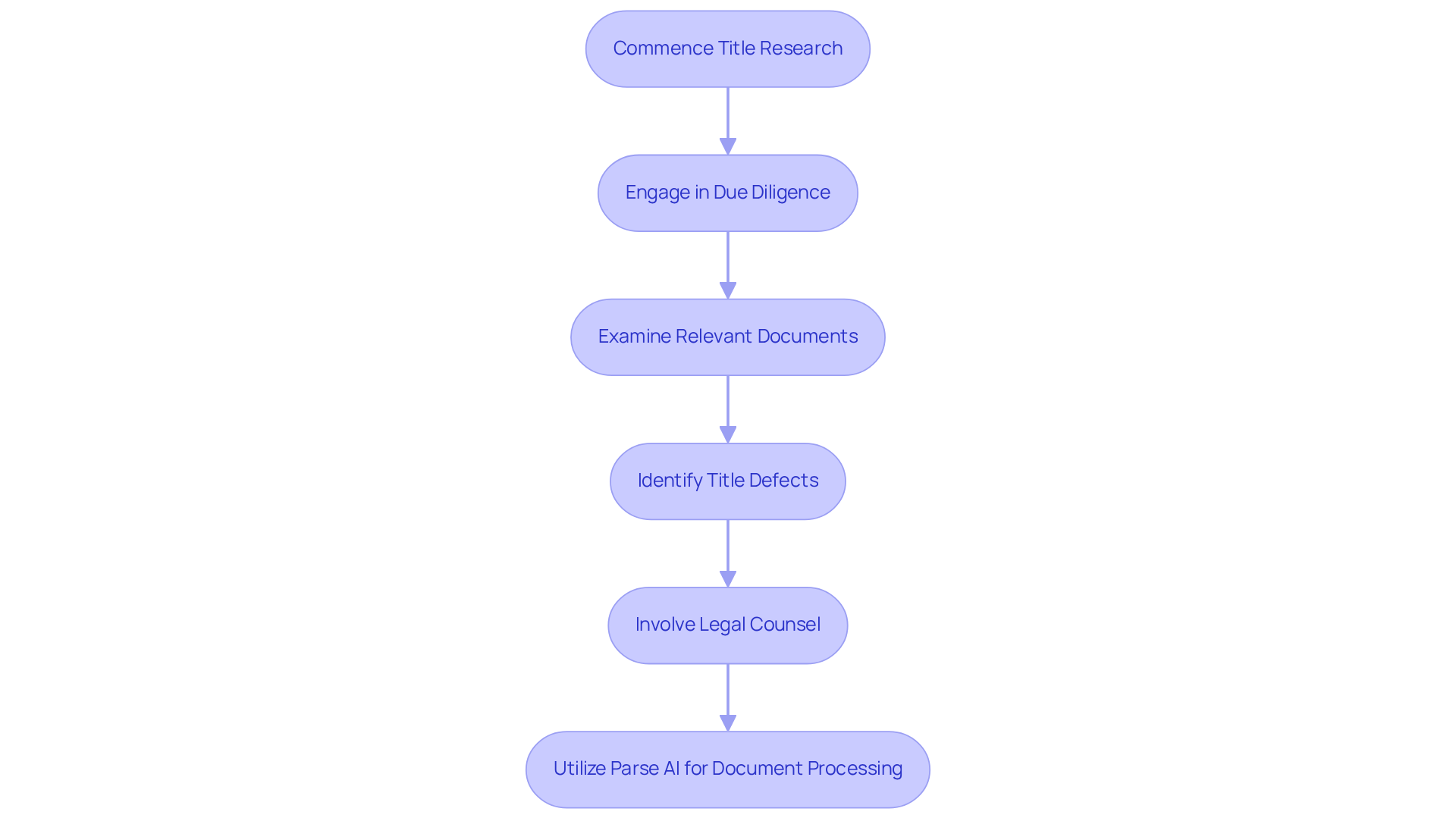
Unrecorded Transfers or Claims: Risks in Title Verification
Unrecorded transfers or claims pose significant risks in property ownership, often leading to confusion and potential disputes. Title researchers must take a proactive stance by thoroughly examining public records and consulting with previous owners or their heirs to uncover any unrecorded interests. Statistics reveal that owner-occupied households accounted for 60.6% of all household units, highlighting the critical need for clear ownership documentation. Title fraud is on the rise, creating substantial risks for attorneys and their clients.
Furthermore, leveraging advanced technologies such as Parse AI can greatly streamline this process, facilitating rapid analysis of extensive datasets to efficiently identify unrecorded claims. As Marie Taylor, a certified fraud examiner, notes, "Grasping the subtleties of research concerning property is vital in thwarting possible fraud and guaranteeing precise ownership records."
When are discovered, legal remedies such as initiating a quiet action may be necessary to clarify ownership and safeguard rights. Moreover, ownership insurance plays a pivotal role in mitigating risks associated with unrecorded claims, providing essential protection for property owners. This proactive approach not only reduces risks but also enhances the overall integrity of real estate transactions.
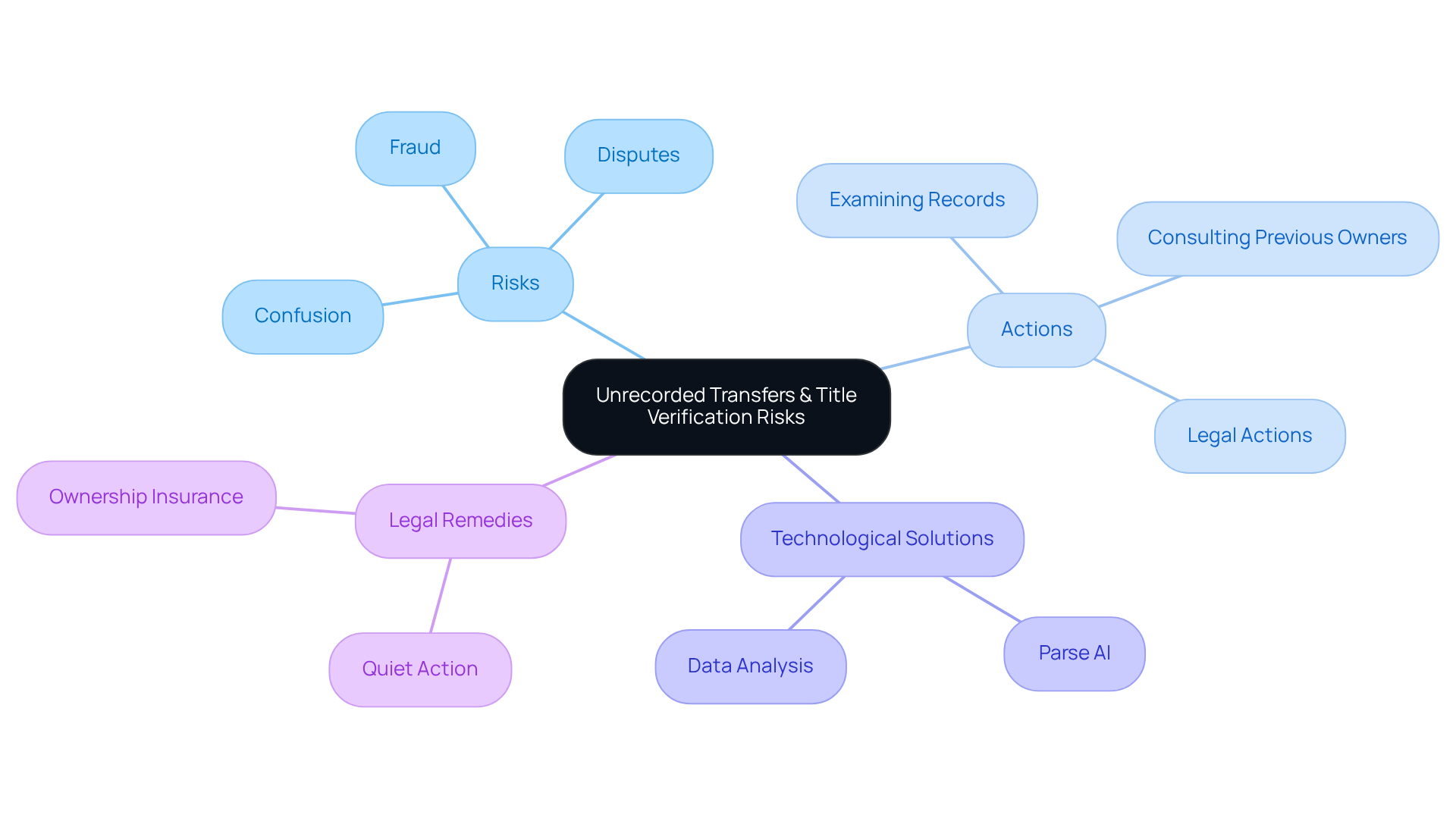
Ensuring Marketability of Title: Best Practices for Landowners
To uphold the marketability of ownership, landowners must implement best practices, including conducting regular ownership searches. These searches are essential for identifying potential issues early. As Sarah Lee highlights, a comprehensive examination of ownership aids in recognizing possible issues, facilitating swift resolution and reducing the likelihood of future conflicts.
Accurate record-keeping is vital; discrepancies must be addressed promptly to avoid complications during property transactions. Furthermore, engaging with insurance providers offers an extra layer of security against potential flaws, delivering financial safety and reassurance for purchasers and lenders.
In addition, recognizing that some states have established marketable ownership laws can assist landowners in navigating legal complexities and ensuring compliance. Utilizing can greatly simplify the verification process, allowing landowners to swiftly pinpoint and address issues before they impact property transactions.
By adopting these proactive measures, landowners can enhance the marketability of their title and safeguard their investments.
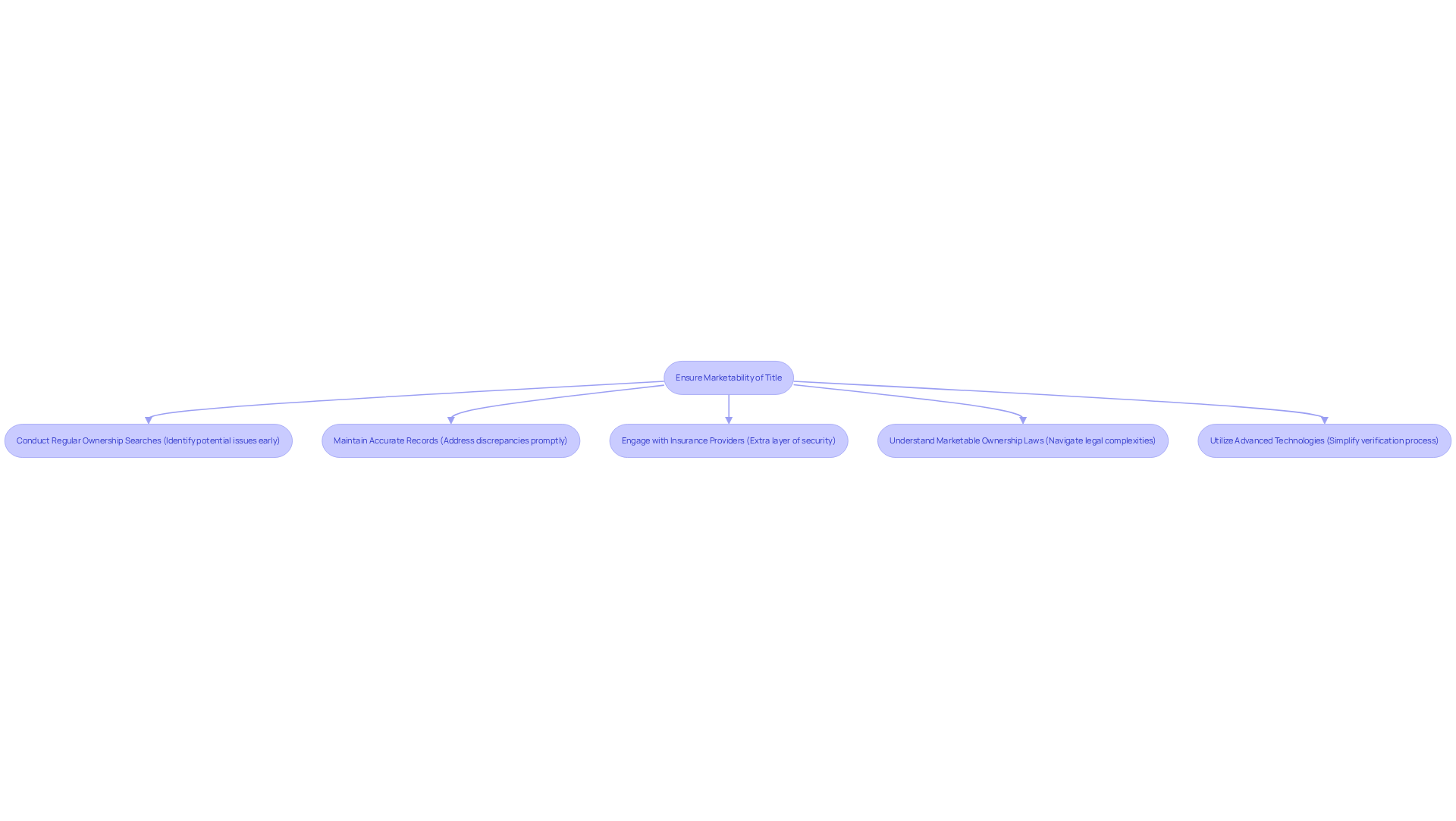
Conclusion
Understanding common title defects in the oil and gas industry is crucial for ensuring seamless transactions and protecting ownership rights. The complexities involved in title research, from incomplete records to discrepancies in ownership information, underscore the need for diligent examination and innovative solutions. By leveraging advanced technologies such as Parse AI, title researchers can significantly enhance their efficiency and accuracy, ultimately safeguarding the interests of property owners and stakeholders.
Throughout the article, key issues such as:
- Incomplete title records
- Boundary disputes
- Adverse possession claims
- The impact of mergers and acquisitions
have been thoroughly explored. Each section highlights the potential risks associated with these defects and offers practical remedies to address them. The importance of meticulous documentation, collaboration with legal experts, and the use of advanced document processing tools cannot be overstated in mitigating these challenges.
In conclusion, the significance of addressing title defects in oil and gas cannot be overlooked. Proactive measures, including regular ownership searches and the integration of technology into research processes, are essential for maintaining the marketability of titles. By prioritizing these practices, landowners and professionals in the industry can not only protect their investments but also foster a more transparent and reliable real estate landscape.
Frequently Asked Questions
What is Parse AI and how does it assist in title research?
Parse AI is a platform that utilizes advanced machine learning and optical character recognition (OCR) to streamline the research process for documents. It quickly extracts crucial information from large collections of document titles, helping researchers identify and correct common title defects in the oil and gas sector, thereby reducing the time spent on property research and enhancing accuracy.
How does Parse AI improve the efficiency of real estate professionals?
By reducing the time spent on paperwork and enhancing accuracy, Parse AI allows real estate professionals to focus more on problem-solving rather than getting overwhelmed by document processing. The ongoing enhancements to the platform ensure it remains adaptable to the challenges in property research.
What risks are associated with incomplete title records?
Incomplete ownership records can lead to disputes over possession and significant financial losses, with the estimated pre-curative risk exposure in the sector ranging from $600 to $900 billion annually.
What strategies can be employed to mitigate the risks of incomplete title records?
Researchers should conduct thorough searches using tools like Parse AI to identify gaps in documentation. A systematic verification of all records, especially historical documents, and collaboration with attorneys to create corrective instruments can effectively address discrepancies.
What causes discrepancies in ownership information?
Discrepancies often arise from clerical errors, outdated records, or unrecorded transfers. These inaccuracies can complicate transactions and lead to disputes over ownership and boundary lines.
How can technology like Parse AI help in resolving discrepancies in ownership information?
Parse AI accelerates the detection of discrepancies in document titles, enabling title researchers to cross-reference ownership records with public databases and historical documents more efficiently.
What corrective measures can be taken once discrepancies are identified?
Corrective measures include filing affidavits or corrective deeds to rectify ownership records, ensuring they accurately reflect the current status. Homeowner's ownership insurance can also protect against hidden encumbrances and boundary disputes.
Why is it important for title researchers to integrate technology into their workflows?
Integrating technology like Parse AI enhances both efficiency and accuracy in the title research process, allowing title researchers to mitigate potential challenges and foster trust in their research outcomes.




